Intro
Discover 5 ways to get RSV, including prevention methods and risk factors, to protect against Respiratory Syncytial Virus infection, bronchiolitis, and pneumonia in vulnerable populations, especially infants and older adults.
Respiratory Syncytial Virus (RSV) is a highly contagious virus that affects people of all ages, but it's most severe in young children and older adults. RSV is the leading cause of hospitalization for children under the age of one, and it's also a significant cause of illness in older adults. Understanding how RSV is transmitted and taking preventive measures can help reduce the risk of getting infected.
RSV is a common virus that can cause mild, moderate, or severe symptoms, depending on the individual's age, health status, and other factors. The virus is highly contagious and can spread quickly through close contact with an infected person, contaminated surfaces, or through the air when an infected person talks, coughs, or sneezes.
In addition to understanding how RSV is transmitted, it's essential to recognize the symptoms of the virus, which can range from mild to severe. Mild symptoms may include runny nose, coughing, sneezing, fever, and loss of appetite, while severe symptoms can include wheezing, rapid breathing, and apnea (pauses in breathing). Recognizing these symptoms and seeking medical attention promptly can help prevent complications and reduce the risk of transmission to others.
Understanding RSV Transmission
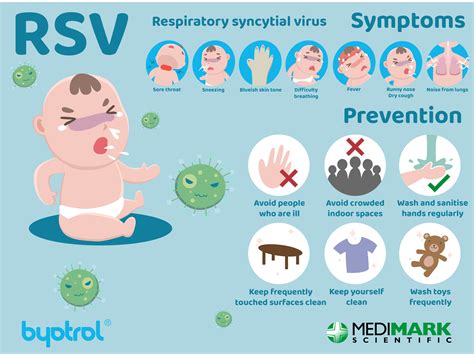
RSV transmission occurs through close contact with an infected person, contaminated surfaces, or through the air when an infected person talks, coughs, or sneezes. The virus can survive on surfaces for several hours and can be spread by touching contaminated surfaces and then touching the eyes, nose, or mouth. Understanding how RSV is transmitted can help individuals take preventive measures to reduce the risk of getting infected.
High-Risk Groups for RSV
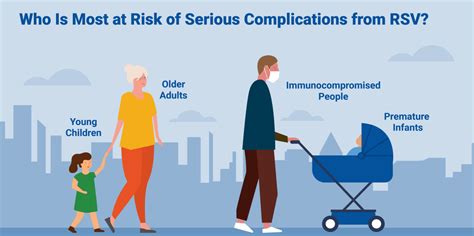
Certain groups of people are at higher risk of developing severe RSV symptoms, including young children, older adults, and people with weakened immune systems. Premature infants, children with heart disease or lung disease, and people with compromised immune systems are also at higher risk. Understanding the risk factors and taking preventive measures can help reduce the risk of transmission and severe symptoms.
Preventive Measures for High-Risk Groups
Preventive measures for high-risk groups include practicing good hygiene, avoiding close contact with people who are sick, and staying up to date on vaccinations. Additionally, high-risk individuals can receive a monthly injection of a medication called palivizumab during RSV season to help prevent severe symptoms.
RSV Season and Transmission
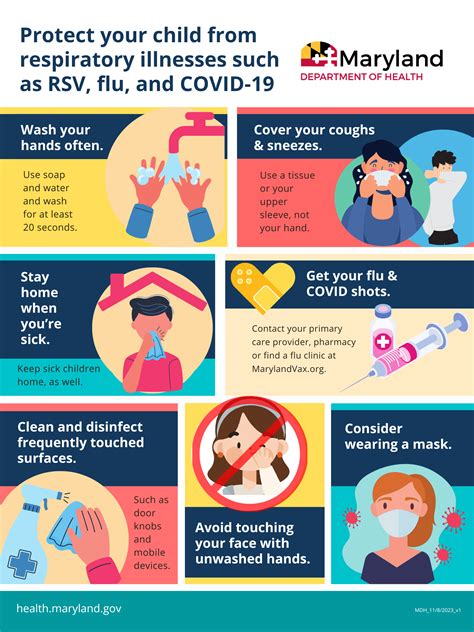
RSV season typically occurs from November to March, with the peak season usually occurring in January and February. During this time, the risk of transmission is higher due to increased indoor exposure and closer contact with others. Understanding the RSV season and taking preventive measures can help reduce the risk of transmission.
Reducing the Risk of RSV Transmission
Reducing the risk of RSV transmission involves practicing good hygiene, avoiding close contact with people who are sick, and staying up to date on vaccinations. Additionally, individuals can take steps to reduce the risk of transmission, such as:
- Washing hands frequently with soap and water
- Avoiding touching the eyes, nose, and mouth
- Avoiding close contact with people who are sick
- Staying home from work or school when sick
- Cleaning and disinfecting surfaces regularly
- Avoiding sharing utensils, cups, or other personal items
RSV Symptoms and Diagnosis
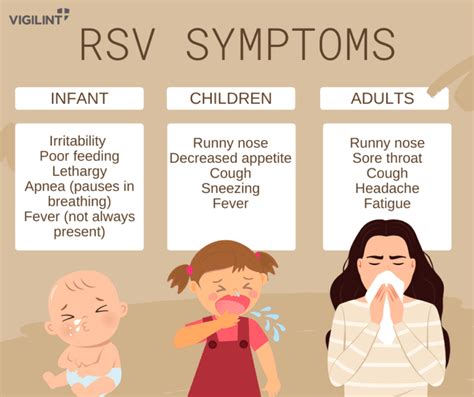
RSV symptoms can range from mild to severe and can include runny nose, coughing, sneezing, fever, and loss of appetite. Severe symptoms can include wheezing, rapid breathing, and apnea (pauses in breathing). Diagnosing RSV typically involves a physical exam, medical history, and laboratory tests, such as a rapid antigen test or a polymerase chain reaction (PCR) test.
Treatment and Management of RSV
Treatment and management of RSV typically involve relieving symptoms and supporting the body's immune system. This can include:
- Rest and hydration
- Over-the-counter medications to relieve symptoms, such as acetaminophen or ibuprofen
- Humidifiers to relieve congestion
- Oxygen therapy to help increase oxygen levels in the blood
- Hospitalization for severe symptoms or complications
Complications of RSV

Complications of RSV can include bronchiolitis, pneumonia, and respiratory failure. Bronchiolitis is an inflammation of the small airways in the lungs, while pneumonia is an infection of the lungs. Respiratory failure occurs when the lungs are unable to take in enough oxygen, requiring mechanical ventilation.
Long-Term Effects of RSV
Long-term effects of RSV can include increased risk of developing asthma and other respiratory problems. Additionally, RSV infection has been linked to an increased risk of developing chronic obstructive pulmonary disease (COPD) later in life.
Prevention and Control of RSV
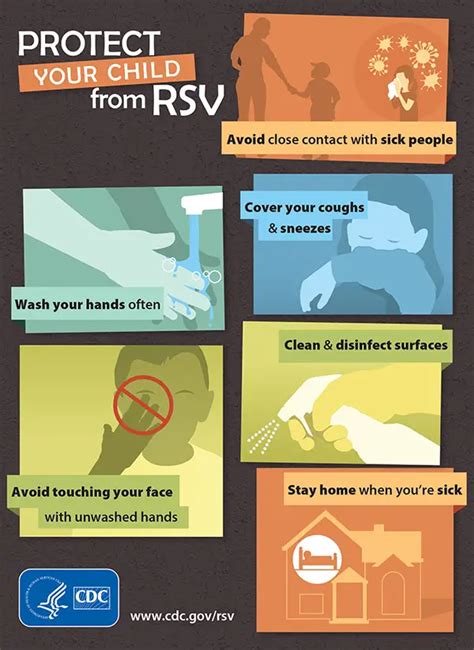
Prevention and control of RSV involve practicing good hygiene, avoiding close contact with people who are sick, and staying up to date on vaccinations. Additionally, individuals can take steps to reduce the risk of transmission, such as washing hands frequently, avoiding touching the eyes, nose, and mouth, and staying home from work or school when sick.
Vaccinations and RSV
Vaccinations can help prevent RSV infection, particularly in high-risk groups. The American Academy of Pediatrics recommends that all children receive the RSV vaccine, and that high-risk individuals receive a monthly injection of palivizumab during RSV season.
Future Directions for RSV Research

Future directions for RSV research include developing more effective vaccines and treatments, as well as improving our understanding of the virus and its transmission. Additionally, researchers are exploring new ways to prevent and control RSV, such as using antiviral medications and developing new diagnostic tests.
Current Research on RSV
Current research on RSV is focused on developing more effective vaccines and treatments, as well as improving our understanding of the virus and its transmission. Researchers are also exploring new ways to prevent and control RSV, such as using antiviral medications and developing new diagnostic tests.
What is RSV and how is it transmitted?
+RSV is a highly contagious virus that can cause mild, moderate, or severe symptoms. It is transmitted through close contact with an infected person, contaminated surfaces, or through the air when an infected person talks, coughs, or sneezes.
Who is at high risk of developing severe RSV symptoms?
+Certain groups of people are at higher risk of developing severe RSV symptoms, including young children, older adults, and people with weakened immune systems. Premature infants, children with heart disease or lung disease, and people with compromised immune systems are also at higher risk.
How can I reduce the risk of RSV transmission?
+Reducing the risk of RSV transmission involves practicing good hygiene, avoiding close contact with people who are sick, and staying up to date on vaccinations. Additionally, individuals can take steps to reduce the risk of transmission, such as washing hands frequently, avoiding touching the eyes, nose, and mouth, and staying home from work or school when sick.
In conclusion, RSV is a highly contagious virus that can cause mild, moderate, or severe symptoms. Understanding how RSV is transmitted and taking preventive measures can help reduce the risk of getting infected. By practicing good hygiene, avoiding close contact with people who are sick, and staying up to date on vaccinations, individuals can help prevent the spread of RSV. We encourage readers to share this article with others to help raise awareness about RSV and its prevention. If you have any questions or comments, please feel free to leave them below.
